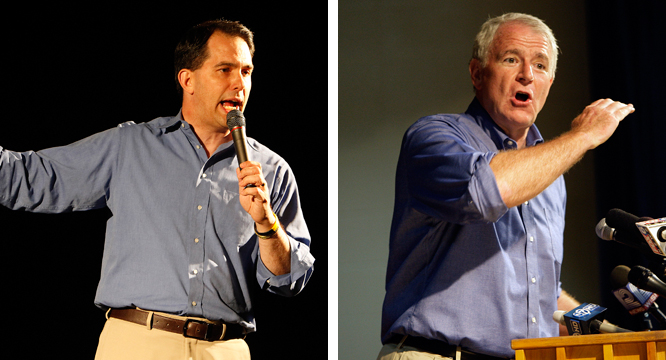The recalls in Wisconsin are finally over — but tallying the mammoth sum of money spent on them in the past year is not.
“It’s a moving target, and we continue to track the money,” said Mike McCabe, executive director of the campaign finance watchdog group Wisconsin Democracy Campaign. “It’s gonna be well into July before we can put a final price tag on the race, because post-election reports filed by the candidates aren’t filed until July 5.”
So far, at least $66 million in spending has been accounted for in the recall races that took place Tuesday, for the gubernatorial recall, the lieutenant governor race and four state Senate races, said McCabe. “Based on what we’re seeing, we expect that the total is going to be in the ballpark of $80 million or more, by the time everything is accounted for. And then if you combine that with spending in last year’s recalls, the overall recall election spending in 2011 and 2012 is gonna be between $125 and $130 million.”
“We’re in a new era of madness, if you ask me,” McCabe said.
However, the campaign spending that has been tracked so far only goes up through the May 21 filings, McCabe said. Of that amount that has been accounted for, Walker spent $29.3 million, and Barrett spent only $2.9 million. Walker was aided by the fact that the state’s campaign finance law allowed him to take in unlimited contributions starting from the time when recall petitions were first circulated in November 2011, up through when the election was officially triggered in late March 2012.
On top of that, Republican-allied groups spent $18 million, and Democratic groups spent $15.5 million, for a total of about $66 million.
The final weeks of the campaign naturally saw a huge burst of activity. Based on the observed pace of television advertising, McCabe estimates that an extra $14 million or more was spent, though the true figures will not be known until July.
In addition to the recall election won by incumbent Republican Gov. Scott Walker, Lt. Gov. Rebecca Kleefisch also held on to her office, as did three of four state senators targeted for recall. Democrats narrowly took one Senate seat and with it the state Senate majority — a majority they will have to defend this November.
Last year, a total of nine state Senate seats were targeted for recall, including six held by Republicans and three held by Democrats. Four Republicans and all three Democrats were re-elected, with Democrats defeating two Republicans for the other seats.









